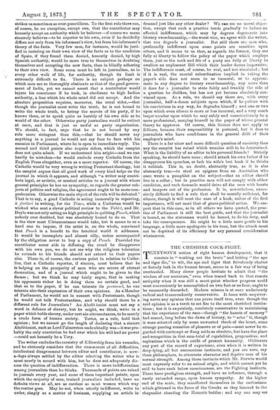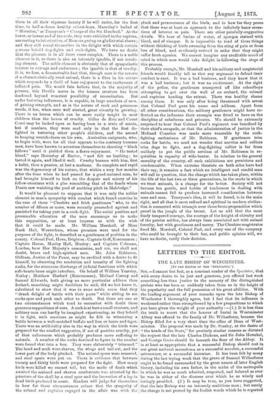THE CHESHIRE COCK-FIGHT.
TENNYSON'S notion of right human development, that it consists in " working out the brute" and letting "the ape and tiger die," to wit, the ape and tiger that frivolously chatter or fiercely lurk in the human breast, seems in a fair way of being overhauled. Many clever people hesitate to admit that " the wisdom of our ancestors," even when traced back to that remote antiquity when it was still a moot-point whether progress could most conveniently be accomplished on two feet or on four, ought to be summarily discarded. Modern science is at once audaciously radical and transcendently conservative. It faces with unquiver- ing nerve any opinion that can prove itself true, even though the said opinion is as a torch to set fire to the most cherished institu- tions ; but it is exquisitely, resolutely conservative in maintaining that the experience of the race—though "the haunts of memory" had ceased, long before the dawn of history, to " echo" it, though it were attested only by some unwonted throb of the heart, some strange passing sensation of pleasure or of pain—must never be re- garded with contempt or flung aside as obsolete, but have due place and recognition in that sum-total of capabilities, propensities, and aspirations which is the outfit of present humanity. Obliterate any part of the record of experience, even when it is written in deep-lying, all but unconscious instincts, and you are sure, say these philosophers, to attenuate character and deprive man of his normal strength. Among those instincts which Mr. Darwin would most expressly refer to an animal origin, and which cannot yet be said to have sunk below consciousness, are the Fighting instincts. These have prodigious strength, and have an influence, through a vastly extended range, upon human sympathy. At the higher end of the scale, they manifested themselves in the enthusiasm which glittered in the faces of the Greeks as they listened to the rhapsodist chanting the Homeric battles ; and any one may see
them in all their vigorous beauty if he will recite, for the first time, to half-a-dozen healthy school-boys, Macaulay's ballad of " Horatius," or Tennyson's " Charge of the Six Hundred." At the lower, or lowest end of the scale, they were exhibited in the rapture, amounting to intoxication, of Romans gazing on gladiatorial shows ; and they still reveal themselves in the delight with which certain persons behold dog-fights and cock-fights. We have no doubt that the pleasure is in all these cases complex. There is a noble element in it, as there is also an intensely ignoble, if not revolt- ing element. The noble element is obviously that of sympathetic interest in courage and endurance ; the ignoble is that of cruelty. It is, we fear, a demonstrable fact that, though man is the reverse of a characteristically cruel animal, there is a fibre in his nature which responds by a thrill of base enjoyment to the excitement of inflicted pain. We would fain believe that, in the majority of persons, this Devil's nerve in the human creature has been deadened beyond remotest possibility of resuscitation. But under fostering influences, it is capable, in large numbers of men, of gaining strength, and as is the nature of rank and poisonous weeds, it has, when once well started, great vivacity in growing. There is no lesson which can be more easily taught to most children than the lesson of cruelty. Gilles de Retz and Count Cenci may be looked upon as having been in a state of mania, but if maniacs, they were mad only in that the first de- lighted in torturing other people's children, and the second in heaping wretchedness on his own. Australian emigrants, who, to begin with, were for all that appears to the contrary humane men, have been known to accustom themselves to shooting " black fellows" until it yielded them a fierce enjoyment. " He tasted blood," says Macaulay of Barere, " and felt no loathing ; he tasted it again, and liked it well. Cruelty became with him, first a habit, then a passion, at last a madness. So complete and rapid was the degeneracy of his nature, that within a very few months after the time when he had passed for a good-natured man, he had brought himself to look on the despair and misery of his fellow-creatures with a glee resembling that of the fiends whom Dante saw watching the pool of seething pitch in Malebolge."
It would be pleasant to suppose that it was only the nobler element in man's sympathy with combat which found exercise in the case of those " Cheshire and Irish gentlemen" who, to the number of fifteen or more, were recently proceeded against and punished for taking part in a cock-fight. The social position and presumable education of the men encourage us to make this supposition, or at least impress us with the wish that it could be made. Mr. William Marshall, of Mere Bank Hall, Weaverham, whose premises were used for the purposes of the fight, is described as a gentleman of position in the county. Colonel Peel, Hove, Brighton ; Captain Goff, Roscommon ; Captain Heron, Manley Hall, Manley ; and Captain Coleman, London, bear Her Majesty's commission, and are, we shall not doubt, brave and high-spirited men. Mr. John Robinson, Oldham, Justice of the Peace, may be credited with a desire to fit himself, by observing the resolution and tenacity of the fighting cocks, for the strenuous discharge of judicial functions with which sof t-hearte bless might interfere. On behalf of William Yeareley, Norley ; Matthew Ilarford (Roscommon), Michael Corney and Samuel Edwards, both giving no more particular address than Ireland, something might doubtless be said, did we but know it, calculated to show that it was in some noble sense that they "drank delight of battle with their peers" while sitting to see cocks spur and peck each other to death. But there are one or two circumstances which tend to encumber with doubt these generous suppositions of ours. A cock is at best a small creature, and military men can hardly be imagined experiencing, as they behold it in fight, such emotions as might be felt in witnessing a battle between a well-matched buffalo and lion or horse and tiger. There was an artificiality also in the way in which the birds were prepared for the conflict suggestive, if not of positive cruelty, yet of that callousness which probably produces more suffering to animals. A number of the cocks destined to figure in the combat were found shut into a box. They were elaborately " trimmed." The head and neck were shaven, the wings and tail cut, and the lower part of the body plucked. The natural spurs were removed, and steel spurs were put on. There is evidence that between twenty and thirty birds were prepared for the fight. How many birds were killed we cannot tell, but the mode of death which awaited the maimed and shaven combatants was attested by the puncture of the skull by a steel spur and the laceration of a leg in dead birds produced in court. Readers will judge for themselves in how far these circumstances evince that the sympathy of the colonel and captains engaged in the affair was with the pluck and perseverance of the birds, and in how far they prove that there was at least an approach to the infinitely baser sensa- tions of interest in pain. There are other painfully-suggestive details. We hear of basins of water, of sponges stained with blood, and of vinegar. It is impossible to read of these things without thinking of birds swooning from the sting of pain or from loss of blood, and studiously revived in order that they might suffer fresh agonies. We cannot imagine any creditable mood of mind in which men would take delight in following the steps of this process.
Probably enough, Mr. Marshall and his military and magisterial friends would frankly tell us that any argument to defend their conduct is cant. It was a bad business, and they knew that it was a bad business ; but it was an excitement. At the sight of the police, the gentlemen scampered off like schoolboys attempting to get over the wall of an orchard, the colonel and captains heading the retreat. There was healthy shame among them. It was only after being threatened with arrest that Colonel Peel gave his name and address. Apart from all other considerations, the military gentlemen might have re- flected on the influence their example was fitted to have on the discipline of subalterns and privates. We should be extremely surprised to hear that Colonel Peel's regiment was benefited by their chief's escapade, or that the administration of justice in the Midland Counties was made more venerable by the cock- fighting enthusiasm of Mr. Robinson. If gentlemen trim cocks for battle, we need not wonder that navvies and colliers trim dogs to fight, and a dog-fighting collier is far from unlikely to put the public services of Mr. Robinson in re- quisition in capacity of wife-beater. In relation to the general morality of the country, all such exhibitions are pernicious and condemnable. When extreme theorists on both sides have had their say, it remains a fact which no intelligent and candid man will call in question, that the change which has taken place, within the life of the last two or three generations, in the mode in which we treat animals, is a change for the better. Society will not become too gentle, and habits of tenderness in dealing with animals cannot fail to produce increased consideration between man and man. Tennyson's idea, it will be found, is in the main right, and all that is most refined and spiritual in modern civilisa- tion is connected with triumph over those brute propensities which prowl in the jungle of the breast. Let us add that the most finely tempered courage, the courage of the knight of chivalry and of the patriot soldier, has always been associated not with animal ferocity, but with gentleness and mercy. The Cheshire magistrates fined Mr. Marshall, Colonel Peel, and every one of the company who could be brought to their bar, and public opinion will, we have no doubt, ratify their decision.































 Previous page
Previous page